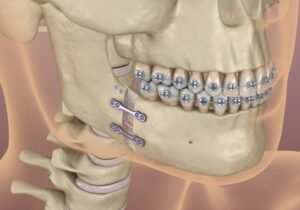
Reconstructive jaw surgery, also known as corrective jaw surgery or orthognathic surgery, has the potential to improve the way your mouth and face look, function, and feel. However, since not many people are familiar with this procedure, you may understandably be nervous about the road ahead. What should you know before you undergo reconstructive jaw surgery? This blog post explains some basic but important facts.
Who Needs Corrective Jaw Surgery?
In many cases, issues like TMJ disorder or bite problems can be corrective via conservative means. However, an oral surgeon might determine that you need corrective jaw surgery if there are severe or complex abnormalities in your jaw. Such issues can cause persistent pain, interfere with your ability to eat and speak, and have an impact on your facial aesthetics.
The need for corrective jaw surgery can arise due to genetic factors, environmental influences, or past injuries.
What Happens During the Surgery?
Before your procedure, your surgeon should explain the details of your unique case so you will know exactly what will happen during your surgery. Basically, your surgical team will do whatever is necessary to correct the positioning and function of your lower jaw. This may involve adding bone and/or using plates and screws to secure the jaw.
All of that might sound intimidating, but there is no need to worry. Since corrective jaw surgery is usually performed under general anesthesia, you can expect not to feel a thing while your team is working.
What Is the Recovery Like?
You may need to stay home from work or school for at least a few weeks while you are healing from your surgery. During that time, you should get plenty of rest and carefully follow your surgeon’s post-op instructions. For example, you may need to take pain medications and consume a liquid diet for a while to avoid putting too much stress on your jaw.
For most people, the benefits of corrective jaw surgery start to become apparent after a few months, when the healing process is well along and much of the swelling has subsided. Of course, if you have any questions or concerns while you are recovering, you should call your oral surgeon.
Corrective jaw surgery is quite an undertaking! However, it is nothing to be afraid of. As long as you entrust yourself to a qualified surgical team, you can expect a good outcome that provides benefits for many years to come.
Meet the Oral Surgeon
Dual-trained in both medicine and dentistry, Dr. Sheng Ji is a highly educated and highly skilled, board-certified oral surgeon. Corrective jaw surgery is among the many services he offers. He and our team always strive to provide a positive experience for each and every patient. To learn more about Dr. Ji and how we may be able to serve you, contact our Carmicheal, CA, office at 916-961-1902.
